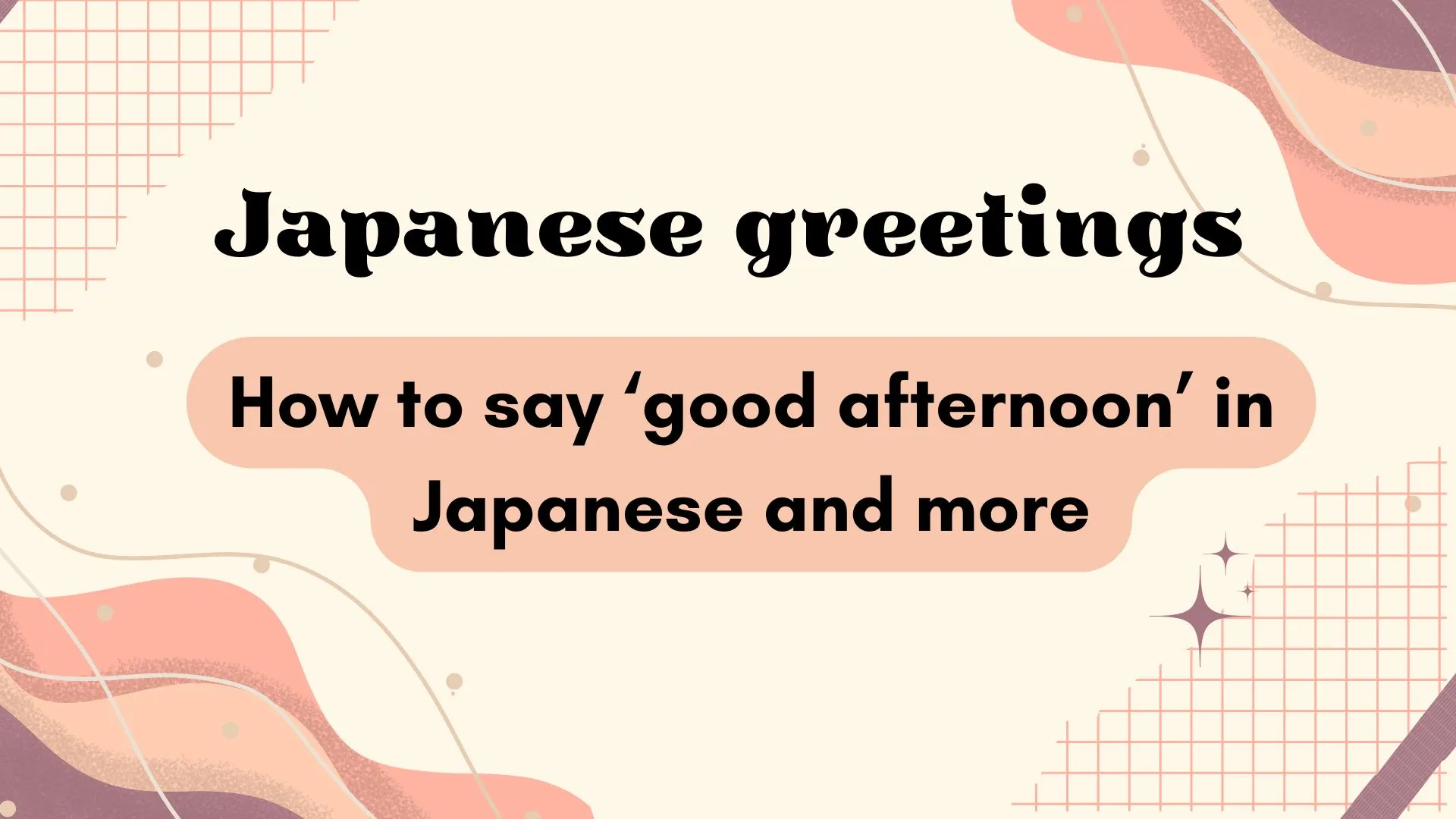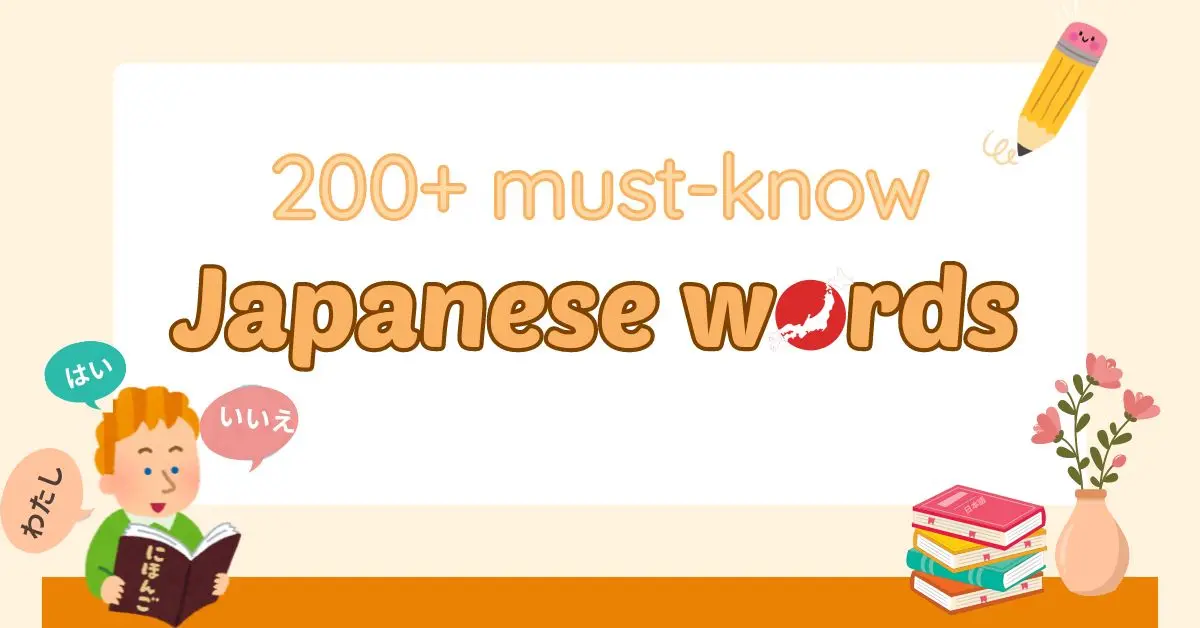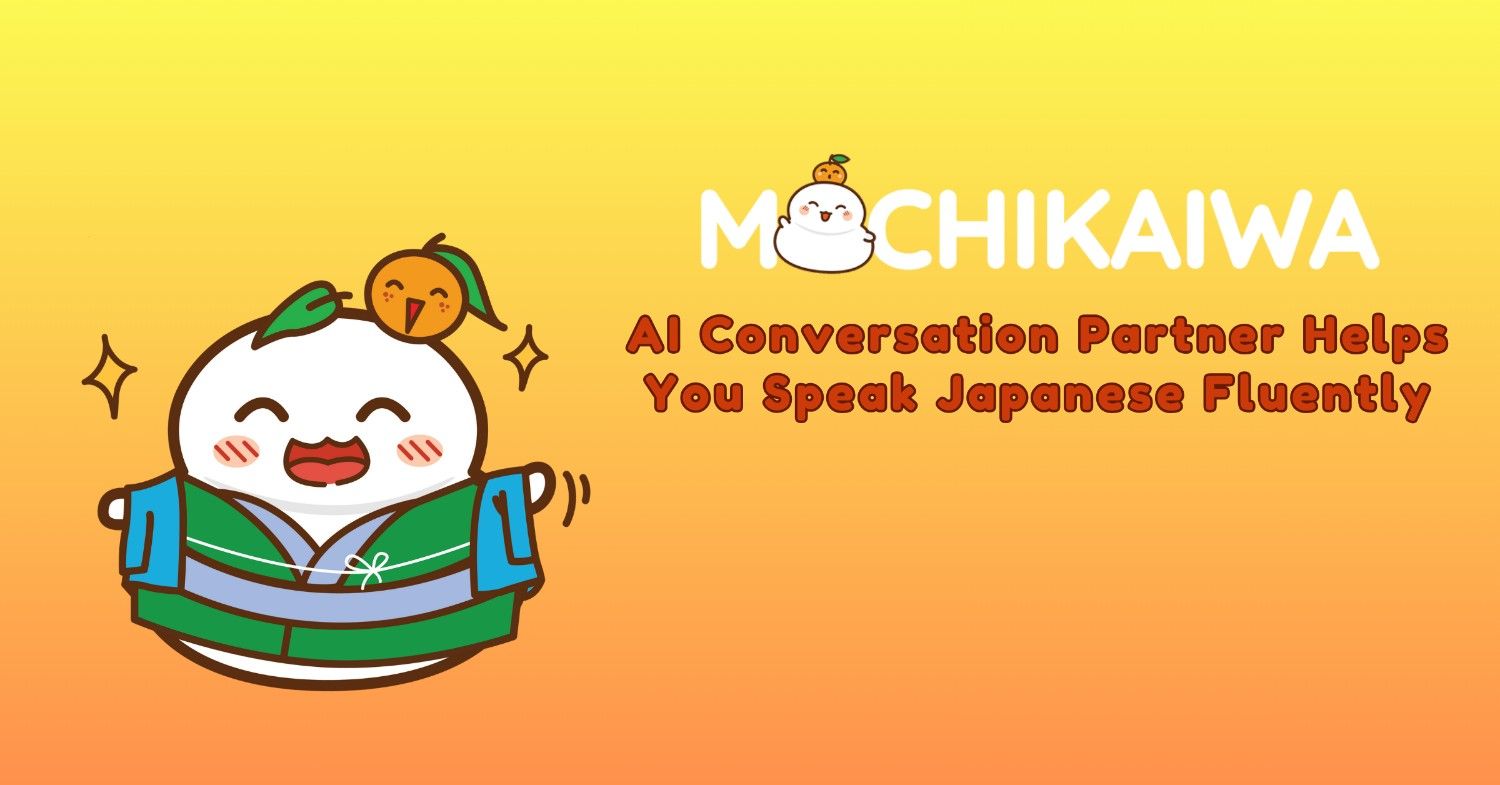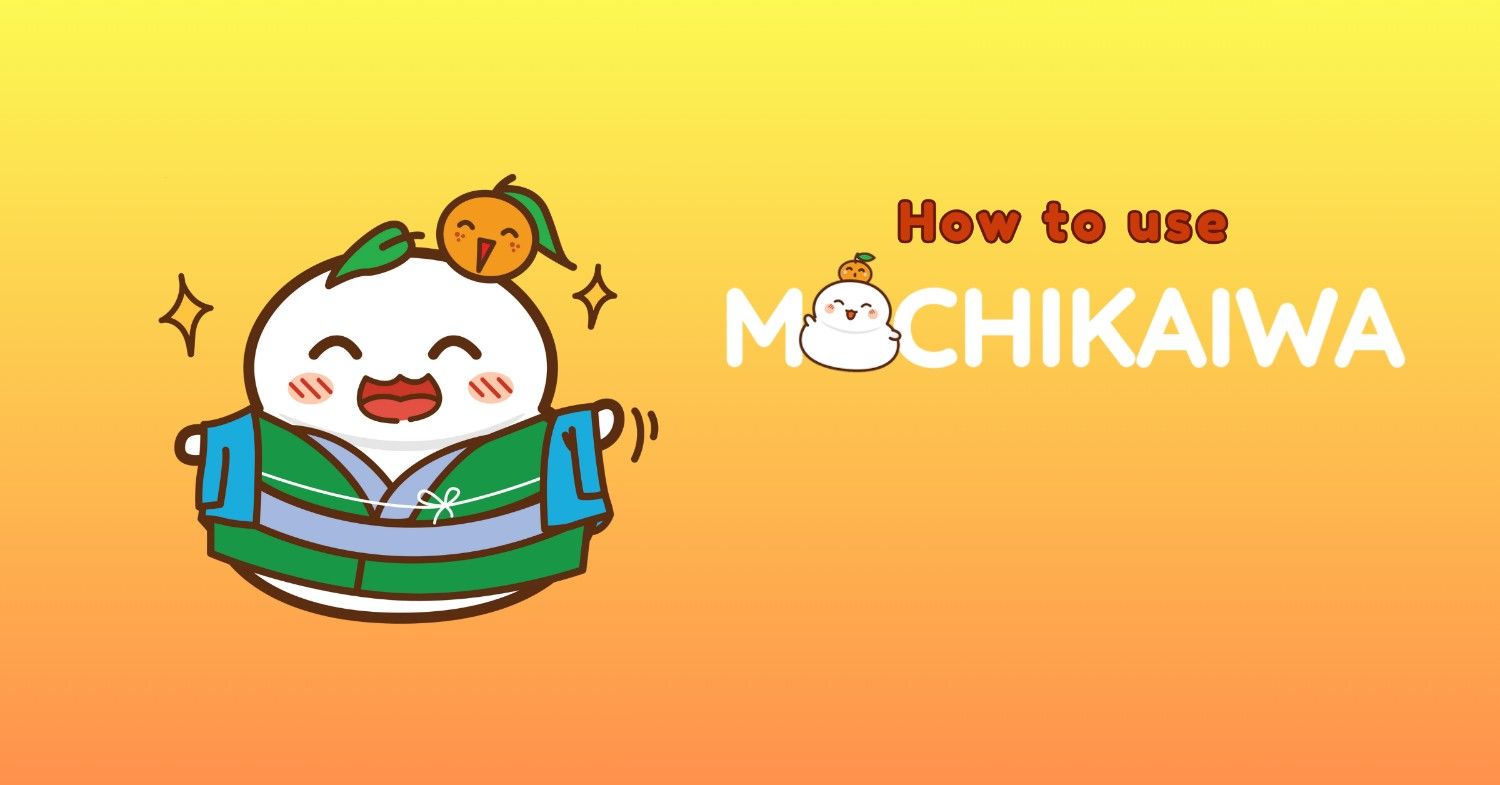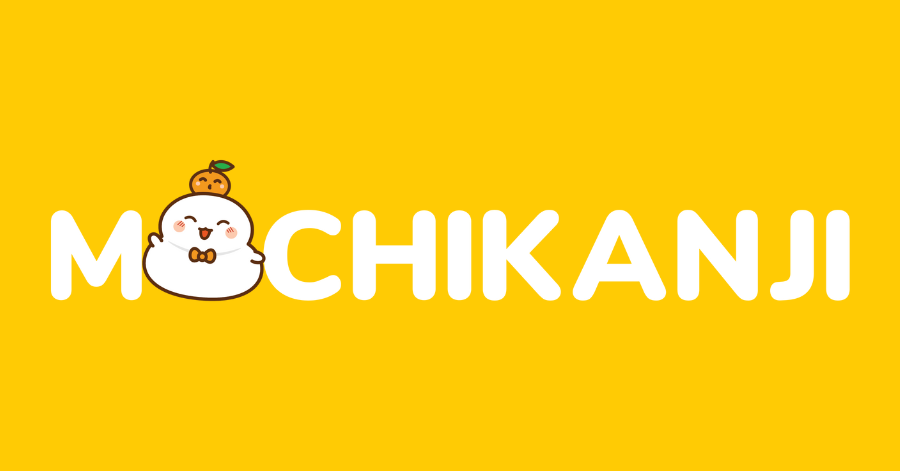If you are learning Japanese or planning a trip to Japan, connecting with Japanese friends, or simply interested in the culture, mastering basic Japanese is essential. This article will guide you through the basic phrases and vocabulary you will need for everyday communication. From greetings and polite responses to dining and special occasions, these essentials will help you tackle common situations with ease and confidence. Let’s learn the basics and lay the foundation for your Japanese learning journey.
- Basic Japanese in greeting
- Basic Japanese vocabulary in daily communication
- People/ Pronouns
- Basic Japanese words for food and drinks
- Japanese phrases for special occasions
- Japanese learning tips for beginners

Basic Japanese in greeting
In Japanese culture, greetings are more than just words; they are a reflection of respect and politeness. Begin your cultural immersion by learning these essential greetings:
Japanese vocabulary for greetings
Depending on the time of day, morning, noon, and evening, the basic greetings in Japanese will be different:
- おはよう (ohayou) – Good morning
Polite greeting: おはようございます(ohayou gozaimasu)
- こんにちは (konnichiwa) – Good afternoon
It is typically used from late morning until early evening, around 11:00 AM to 5:00 PM.
- こんばんは (konbanwa) – Good evening
It is generally used from early evening until night, starting around 5:00 PM or 6:00 PM.
- おやすみ (oyasumi) – Good night” or Rest well
Polite greeting: おやすみなさい (oyasuminasai)
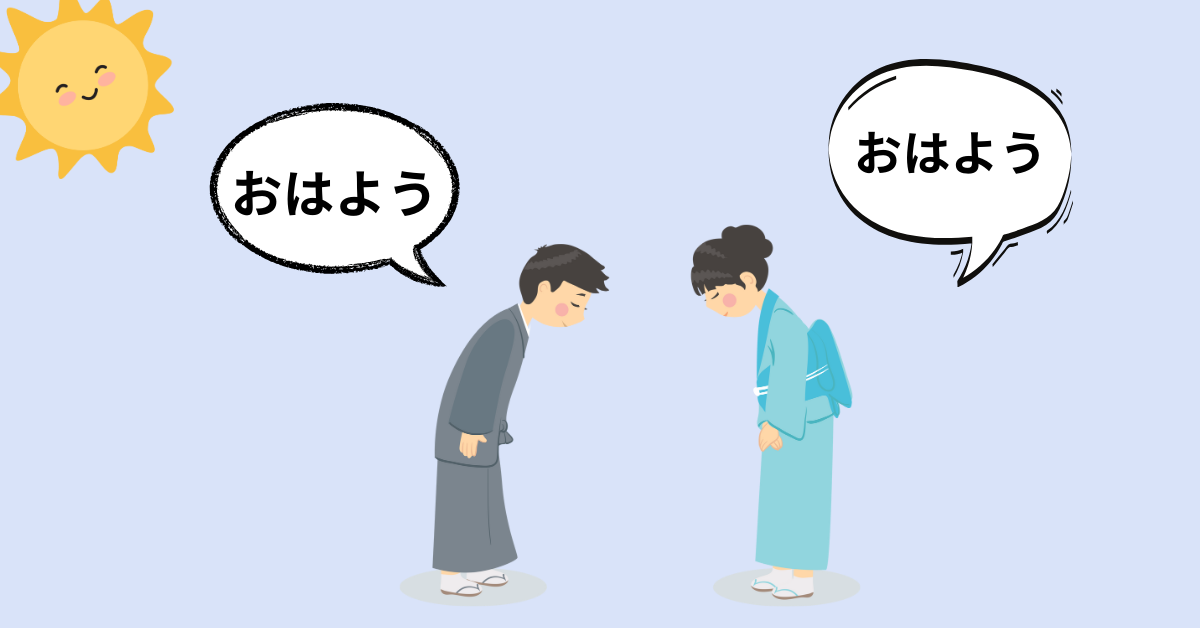
Greetings when meeting
The first time you meet someone in a meeting or appointment, use the following basic Japanese phrase:
- はじめまして (hajimemashite) – Nice to meet you
Goodbye
When leaving or saying goodbye to someone, the vocabulary that is often used is:
- The polite way to say さようなら (sayounara) – Goodbye
- The youthful way to say ばいばい (baibai) – Bye bye
- If you plan to meet the other person again またね (matane) – See you again
Above are the most basic and common phrases for greetings. Knowing these phrases will help you communicate confidently! You can learn more phrases about greetings in MochiKanji’s communication course.
Try it for free now!
Basic Japanese vocabulary in daily communication
Thanks and sorry
- ありがとう (arigatou) – Thank you
Politely: ありがとうございます (arigatou gozaimasu)
Many of you may have heard of the famous phrase Arigatou gozaimasu. If you find it a bit long and difficult to remember, you can just say “Arigatou”. Although it is not as formal as the whole sentence, it is very cute when a foreign tourist says thank you in Japanese because they tried to use their language.
- ごめん (gomen) – Sorry
Politely: ごめんなさい (gomennasai)
Sumimasen (すみません) and Gomennasai (ごめんなさい) are probably the two words most used by Japanese people. These catchphrases are used frequently and unconsciously in their daily lives.
Sumimasen and Gomennasai both mean “I’m sorry”. However, Sumimasen is used more commonly, with the main purpose of getting someone’s attention (like “excuse me, I’d like to bother you for a moment…), not necessarily in a formal way. Gomennasai, on the other hand, is used when you’ve done something wrong.
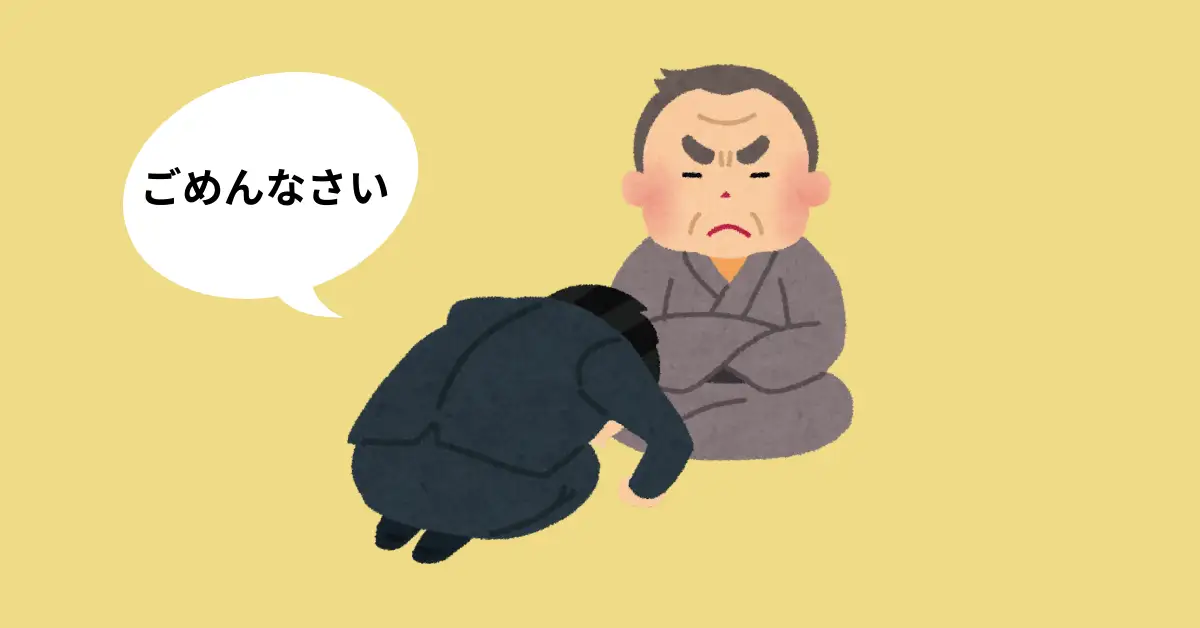
Basic Japanese vocabulary when eating
- いただきます (itadakimasu) – I’ll enjoy having this
This word is used before eating.
- ごちそうさまでした (gochisousamadeshita) – Thank you for the meal
This word is used after eating.
Daily conversation sentences
- わかりました (wakarimasita) – Got it
Show that you understand/know
- わかりません (wakarimasen) – I don’t understand
Show that you don’t understand/don’t know
If a Japanese person says something you don’t understand, say “Wakarimasen” which means “I don’t understand”. This is probably the most commonly used phrase by tourists when they hear native speakers speak but don’t understand anything.
- もう少しゆっくり話してください (mou sukoshi yukkuri hanashite kudasai) – Please speak a little more slowly
Ask the other person to speak more slowly.
People/ Pronouns
One of the most difficult things about learning basic Japanese vocabulary is understanding how people use pronouns. Unlike most languages, Japanese people tend to avoid using pronouns in conversation when it is clear who is being addressed. Instead, they often use the person’s name, family role, or social role to refer to them.
In Japanese culture, addressing someone without using their name is considered disrespectful. Therefore, it is common to not use “you,” “he,” or “she” if you already know the person’s name. If you are learning Japanese, keep this in mind when using pronouns.
- 私、僕、俺 (Watashi/ Boku/Ore) – I
- 友達 (Tomodachi) – Friend
- 同僚 (Douryou) – Co-worker
- 部長(Buchou) – President (of a company)
- 社長 (Shachou) – Boss (of a company)
- 家族 (Kazoku) – Family
- お父さん (Otousan) – Father
- お母さん (Okaasan) – Mother
- お兄さん (Oniisan) – Older brother
- お姉さん (Oneesan) – Older sister
- 弟 (Otouto) – Younger brother
- 妹 (Imouto) – Younger sister
- 大人 (Otona) – Adults
- 子供 (Kodomo) – Children
- 彼氏 (Kareshi) – Boyfriend
- 彼女 (Kanojo) – Girlfriend
- 男の人 (Otoko no hito) – Man
- 女の人 (Onna no hito) – Woman
Basic Japanese words for food and drinks
Japan boasts a culinary heritage of unparalleled richness and diversity. Tokyo, its vibrant capital, stands as a global epicenter for gastronomy, holding the world record for Michelin-starred restaurants. The nation’s palate is a captivating tapestry woven from the threads of Washoku, its traditional cuisine, and Yoshoku, a harmonious blend of Western and Japanese flavors. To embark on a culinary exploration of Japan, a foundation in basic food and drink vocabulary is essential.
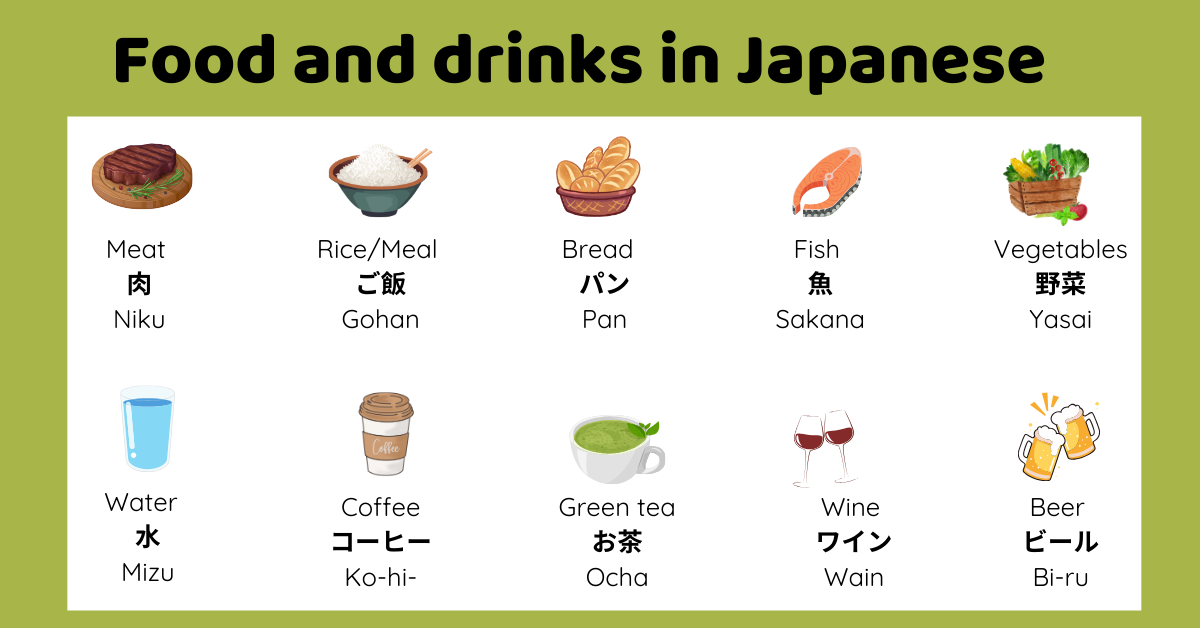
- 朝ご飯 (Asa gohan) – Breakfast
- 昼ご飯 (Hiru gohan) – Lunch
- 晩ご飯 (Ban gohan) – Dinner
- ご飯 (Gohan) – Rice/Meal
- パン (Pan) – Bread
- 肉 (Niku) – Meat
- 魚 (Sakana) – Fish
- 野菜 (Yasai) – Vegetables
- 水 (Mizu) – Water
- お茶 (Ocha) – Green tea, Tea in general
- コーヒー (Ko-hi-) – Coffee
- お酒 (Osake) – Sake, Alcohol in general
- ワイン (Wain) – Wine
- ビール (Bi-ru) – Beer
Above is the most basic and common vocabulary about food and drinks. By understanding this vocabulary, you can confidently introduce food and drinks! You can learn food and drink vocabulary with full pictures, phonetic transcriptions, pronunciation, and example sentences in MochiKanji’s vocabulary course.
Start your free trial now!
Japanese phrases for special occasions
What if you’ve found yourself speaking to a native Japanese person for the first time because you decided to go to a celebration or special event, like a birthday or festival? Here are a few useful phrases for almost any situation you might find yourself in.
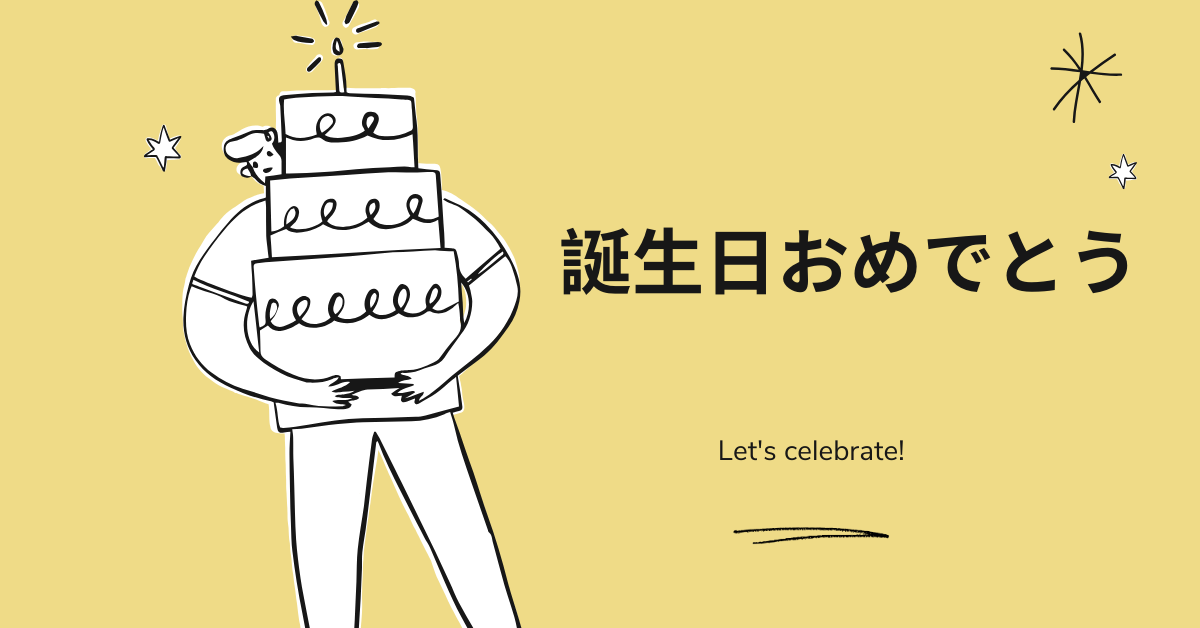
- 気を付けて (Ki wo tsukete) – Be careful (Hint: you might say this to someone going on a trip)
- よくできました (Yoku dekimashita) – Great job
- おめでとうございます (Omedetou gozaimasu) – Congratulations
- 誕生日おめでとう (Tanjoubi omedetou) – Happy birthday
- 乾杯 (Kanpai) – Cheers (Hint: you should really only go for this one if you actually have a drink of some sort in your hand)
Basic Japanese learning tips for beginners
Learn some key phrases
Are you wondering what the quickest way to learn to speak Japanese is? It’s simple! Start with the list of the most common words and expressions. Knowing basic phrases like “Hello” “How do you do?” and “Nice to meet you” allows you to begin speaking and quickly join conversations with native speakers.
To make sure you’re understood when speaking to natives, make an effort to perfect your Japanese pronunciation. One way to do this is to record yourself saying these phrases and review your efforts.
Use apps to get started
A language-learning app will be very helpful when you start learning Japanese. MochiKanji is a very simple app for beginners to learn basic Japanese phrases and vocabulary. This app allows you to study anywhere and anytime you want with a spaced repetition system.
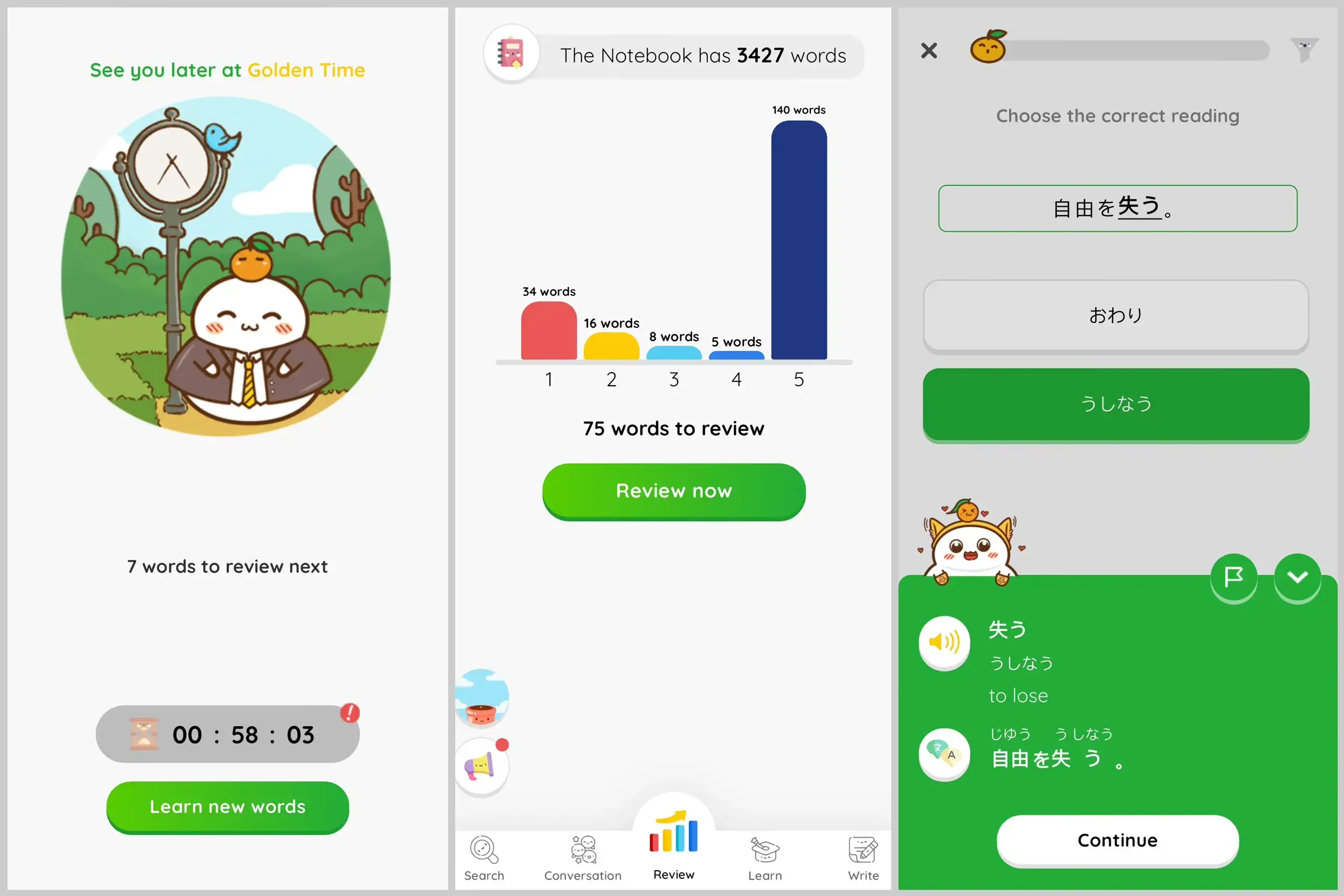
This application provides vocabulary for the JLPT N5-N2 exam by topic and sample conversations, with images and sounds. You can look up new words on J-Dictionary save them in your study notebook, and practice using the spaced repetition method with MochiKanji’s Golden Time feature. In addition, the application also provides popular conversations on many topics such as hobbies, weather, and health, making the learning process more lively and easier.
Pay attention to flashcards
Flashcards are perfect for language learners. It’s a card with information on it that you need to remember. To memorize a particular word in Japanese, you can use a flashcard with this word on it. When you flip the card over, you’ll see a translation into your native language.
If you’ve never tried flashcards, you should make them a part of your learning journey. With flashcards, you can:
- Label items in your home with their Japanese names to see them every day.
- Regularly repeat new words and quiz yourself.
- Ask a friend to quiz you to see if you remember the words correctly.
Chat online with native speakers or other learners
The best way to learn to speak Japanese and strengthen what you’ve already learned is to practice regularly with others. Even if you don’t have a native friend, you have various options to put your knowledge into practice these days.
For example, you can opt for 1-on-1 video chats to find a language partner who speaks Japanese. Using your smartphone or computer, you’ll be able to talk or write online to native speakers or learners from all around the globe.
Conclusion
The basic vocabulary above will help you start communicating with Japanese people. However, to be able to study or live in Japan, you will need more than that. Continuous study and practice are the keys to achieving fluency. With perseverance, you will go far on the road to Japanese proficiency.

